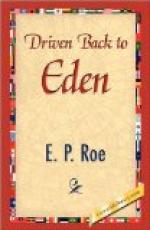From this point we could see the great pyramid of fire and smoke ascending into the black sky. The rain-drops glittered like fiery hail in the intense light and the still vivid flashes from the clouds.
“This is hard luck, neighbor Durham,” said Mr. Jones, with a long breath.
“My wife and children are safe,” I replied, quietly.
Then we heard the horse neighing and tugging at his halter. Bagley had the good sense and will to jerk off his coat, tie it around the animal’s eyes, and lead him to a distance from the fatal fascination of the flames.
In a very brief space of time the whole structure, with my summer crop of hay, gathered with so much labor, sunk down into glowing, hissing embers. I was glad to have the ordeal over, and to be relieved from fear that the wind would rise again. Now I was assured of the extent of our loss, as well as of its certainty.
“Well, well,” said the warm-hearted and impulsive Rollins, “when you are ready to build again, your neighbors will give you a lift. By converting Bagley into a decent fellow, you’ve made all our barns safer, and we owe you a good turn. He was worse than lightning.”
I expressed my thanks, adding, “This isn’t as bad as you think; I’m insured.”
“Well, now, that’s sensible,” said Mr. Jones. “I’ll sleep better for that fact, and so will you, Robert Durham. You’ll make a go of it here yet.”
“I’m not in the least discouraged,” I answered; “far worse things might have happened. I’ve noticed in my paper that a good many barns have been struck this summer, so my experience is not unusual. The only thing to do is to meet such things patiently and make the best of them. As long as the family is safe and well, outside matters can be remedied. Thank you, Bagley,” I continued, addressing him, as he now led forward the horse. “You had your wits about you. Old Bay will have to stand under the shed to-night.”
“Well, Mr. Durham, the harness is still on him, all ’cept the head-stall; and he’s quiet now.”
“Yes,” I replied, “in our haste we didn’t throw off the harness before the shower, and it has turned out very well.”
“Tell ye what it is, neighbors,” said practical Mr. Jones; “’tisn’t too late for Mr. Durham to sow a big lot of fodder corn, and that’s about as good as hay. We’ll turn to and help him get some in.”
This was agreed to heartily, and one after another they wrung my hand and departed, Bagley jogging in a companionable way down the road with Rollins, whose chickens he had stolen, but had already paid for.
I looked after them and thought: “Thank Heaven I have not lost my barn as some thought I might at one time! As Rollins suggested, I’d rather take my chances with the lightning than with a vicious neighbor. Bagley acted the part of a good friend to-night.”
Then, seeing that we could do nothing more, Merton and I entered the house.




